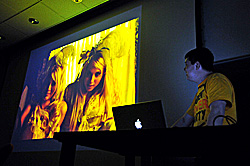
Click here for video coverage of the event.
Imagine watching a pornographic movie.
Now, imagine watching one surrounded by 200 of your peers, five university administrators and dozens of media members – all in the name of free speech.
Despite not endorsing the screening of the triple-X film, Pirates II: Stagnetti’s Revenge, university administrators still attended the Student Power Party’s screening of the first 30 minutes of the movie last night in Susquehanna Hall. Administrators allowed the screening to occur despite threats by state senators that they would cut funding for the university.
As administrators sat in the back row watching the hardcore porn unfold, students cheered, groaned and giggled at the graphic scenes in the short portion of the 138-minute film. Though only a fraction of the film, the segment was still explicit and included two different sets of threesomes – one with “Devil Stick Willy” and two blondes in corsets.
But the focus of the event was not the film itself, but rather free speech – a response to State Sen. Andy Harris’ (R-Baltimore County & Harford) proposed amendment to the state budget that would have cut all state funding to any public college or university that screened triple-X films.
“Sen. Harris was acting irresponsible to endanger the education of 30,000 students and university employees,” said Malcolm Harris, a former opinion columnist for The Diamondback columnist and Student Government Association presidential candidate for the Student Power Party. “It was awfully childish [behavior] for a state senator.”
Sen. Harris, who couldn’t be reached for comment, told The Washington Post he planned on retaliating if the film was shown.
“We can’t allow Annapolis to dictate freedom of speech on this campus,” said Robin Sawyer, a human sexuality expert and university professor who was one of four experts the Student Power Party brought in to comment on the event. “You’re 18; if you want to see this movie, you should be able to see this movie.”
Although university administrators said they hadn’t planned on censoring the film before the General Assembly threatened funds, campus spokesman Millree Williams said the university does not support screening pornographic films. But, he said, regardless of the university’s personal views, administrators recognize the students’ right to challenge what they see as an affront to their freedoms.
“We’d prefer to be having this discussion in other ways,” Williams said. “The students have reframed this in the context of a discussion of the First Amendment and free speech. It’s an opportunity to address some very serious rights that all Americans have.”
But Malcolm Harris said after canceling the showing on Saturday night, the administration did not do anything to restrict or regulate the triple-X film.
“It happened late, but it happened,” he said. “And we’re happy with that.”
The film screening was preceded by a press conference and a panel discussion, which the Student Power Party, who spearheaded the effort to bring back the porn, focused on free speech and censorship.
“Entertainment of all types is entitled to First Amendment rights in this country,” said David Rocah, an attorney for the American Civil Liberties Union. “Student speech is fully supported by the First Amendment. This is a teachable moment [over] something that is not that important.”
Professors who teach sexually explicit material in other disciplines were outraged by the state’s attempt to censor the university, they said. Sawyer called the senate’s amendment “blackmail.”
“Any time spent on this is a violation of their oath of office,” government and politics professor Mark Graber said.
Sawyer noted that he taught a lesson on pornography two weeks ago and the state has no right to censor students or professors, adding that condoms in the University Health Center might be the next thing the state legislature regulates for “moral issues.”
“Most of the literature I’ve taught has pornographic elements,” said English professor Martha Nell Smith, citing Christopher Marlowe, William Shakespeare and Emily Dickinson as authors of works with heavy sexual content. “I don’t believe [sexual content] should be censored in my classroom. [The university’s] job is to work together to contextualize it.”
taustindbk@gmail.com



